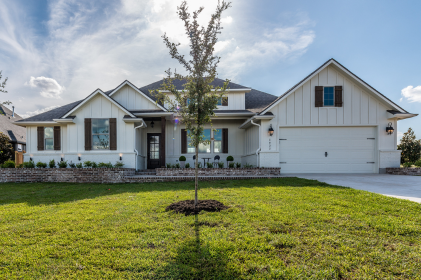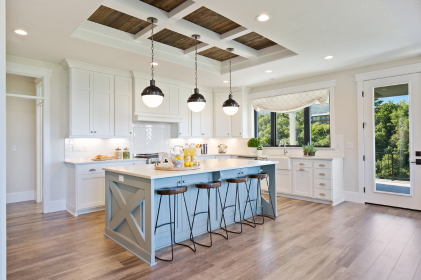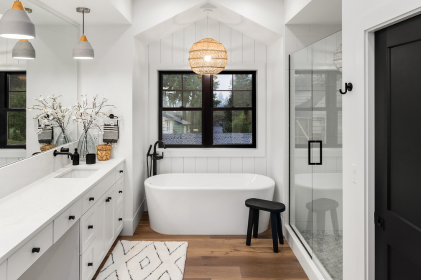Searching for your dream home is such an exciting step, but it’s essential to approach it with a well-thought-out plan. Whether you’re a first-time buyer or an experienced homeowner, creating a house-hunting checklist can help ensure that you make a well-informed decision when browsing homes. We’ve compiled a comprehensive guide to assist you in your house-hunting journey. This checklist will cover various aspects, from price considerations to the condition of the house’s interior and exterior, so you can find the perfect home that meets both your family’s wants and needs.
Price
Price is one of the most crucial factors in your house-hunting journey. It’s essential to set a budget that aligns with your financial capabilities and long-term goals. Understanding your financial constraints and options is the first step in finding a home that fits your budget and lifestyle. Before you start searching for homes, take the time to consider these important financial aspects:
- Determine the price range you can afford: Begin by assessing your current financial situation. Consider factors such as your income, existing debts, and the savings you have available for a down payment. By establishing a realistic price range, you can narrow down your options and avoid wasting time on properties that are outside your budget.
- Calculate the amount you can contribute for your down payment: A substantial down payment can have a significant impact on your mortgage terms and monthly payments. Consider how much you can comfortably contribute upfront, as this can affect your overall homeownership costs.
- Evaluate potential mortgage payments: Different mortgage options come with varying interest rates and terms. It’s crucial to evaluate how different mortgage scenarios will impact your monthly budget. By doing so, you can ensure that your monthly payments align with your financial goals and lifestyle.
Location

Location plays a significant role in your daily life, affecting factors such as your commute, access to amenities, and the quality of nearby schools. Choosing the right location is an important factor when it comes to your overall satisfaction with your new home and can greatly influence your daily routine and overall lifestyle. Selecting a location that aligns with your needs and preferences ensures that you’ll be satisfied with your home’s surroundings for years to come!
- Proximity to your workplace: The location of your new home can significantly impact your daily commute. Think about how far you’re willing to travel to work each day and consider the transportation options available in the area.
- Nearby schools and their quality: If you have children or plan to start a family, the quality of nearby schools is important to consider. Research the local school district, including its reputation, available classes & extracurriculars, and proximity to your potential home.
- Availability of essential infrastructure and amenities: Consider the convenience of the location in terms of access to grocery stores, hospitals, public transportation, and other vital services. A well-connected neighbourhood can make your daily life more convenient.
- Access to parks and recreational areas: If you enjoy outdoor activities or have a passion for spending time in parks and green spaces, evaluate the proximity of these amenities to your potential home.
The House’s Exterior

The exterior of the house sets the stage for your living experience and can impact maintenance requirements and outdoor activities. When considering the house’s exterior, you’ll want to examine various elements to ensure they align with your preferences and lifestyle.
- Lot size and yard space: The size of the lot and the available outdoor space can influence your gardening aspirations, space for children or pets to play, and potential for outdoor entertainment. Assess whether the property offers the outdoor experience you desire.
- Garage/shed: Check into the garage’s size and storage capacity. Consider whether it can comfortably accommodate your vehicles, if necessary, and provide adequate storage for tools, sports equipment, or other belongings.
- Condition of the roof and exterior features: The roof’s condition and the state of the landscaping can affect maintenance costs and the home’s overall aesthetic. Be sure to inspect the roof for any signs of damage or aging, and
- Landscaping: Consider the effort required to maintain the landscaping. Are you looking for something low maintenance or would you like to spend time working on your lawn and garden?
- Privacy and proximity to neighbouring houses: Your level of privacy and your relationship with neighbours can significantly impact your daily life. Consider the distance between your home and neighbouring properties to ensure the level of privacy that suits your preferences.
- Sunlight and orientation of the house: The direction in which the house faces can affect the amount of natural light it receives throughout the day. Think about how sunlight enters the home and whether it aligns with your preferences for each room.
The Interior of the House
The interior of the house should reflect your style, offer adequate space, and meet your family’s needs. When exploring the interior of potential homes, consider various factors to ensure they align with your preferences. This is where you’ll spend most of your time and it should reflect your preferences, provide the necessary space, and offer functionality for your family’s daily routines.
- Aesthetic and style of the house: The interior design and style of the house should resonate with your personal taste. Consider whether the layout and aesthetics match your vision for your dream home.
- Available storage space: Adequate storage is essential for maintaining an organized and clutter-free home. Evaluate the availability of closets, cabinets, and storage solutions throughout the house.
- Flooring condition and style: Examine the condition and type of flooring in each room. Flooring not only impacts the overall look of the house but also its maintenance and comfort.
- Functionality of windows, doors, knobs, locks, and latches: Ensure that all interior elements, from windows to door hardware, work correctly. Properly functioning features contribute to a hassle-free daily experience.
The Kitchen

The kitchen is often the heart of the home, so it’s essential to ensure it meets your culinary needs and preferences. The kitchen is a central hub for family activities and entertaining, and ensuring it meets your needs will enhance your daily life and create a welcoming space for family and friends.
- Are appliances included? Determine whether the sale includes essential kitchen appliances, such as a refrigerator, stove, oven, and dishwasher. This can impact your budget and convenience.
- Layout and functionality of the kitchen: Assess the kitchen’s layout and how it accommodates your cooking style and family’s needs. An efficient layout can enhance your cooking experience.
- Storage and counter space: Adequate storage and counter space are essential for meal preparation and organization. Ensure there’s enough room for your kitchen essentials, pantry items and cooking activities.
- Room for meal preparation and cooking: Consider the workspace available for meal preparation and cooking. If you enjoy spending time in the kitchen, an ample counter area and convenient layout can make cooking enjoyable.
Living Areas
Your living spaces should provide comfort, functionality, and the amenities you desire. Comfortable living areas contribute to a satisfying home environment for your family and guests. When evaluating the living areas of potential homes, consider these critical factors:
- Sufficient space for your family: Ensure that the living areas can accommodate your family’s needs and furniture. Consider your family’s size and any additional space requirements.
- Lighting, both natural and artificial: Assess the quality of lighting in each room, as it can greatly affect the ambiance. Natural light can enhance the overall atmosphere and reduce the need for artificial lighting.
- Desired amenities like fireplaces or entertainment systems: Determine if the living areas offer the features you desire, such as a fireplace or built-in entertainment systems.
Bedrooms
Bedrooms are personal sanctuaries, and their size and layout should align with your family’s needs. Your bedrooms should provide restful and private spaces for everyone in your household. When considering the bedrooms in potential homes, take these factors into account:
- Number of bedrooms required: Determine how many bedrooms your family needs. Consider your current family size and any future changes or needs.
- Size and closet space: Assess the size of the bedrooms and the availability of closet space. Sufficient closet space is a must for organizing and storing clothing and personal belongings.
- Bedroom layout and arrangement: Consider how the bedrooms are positioned within the house. Think about the convenience of bedroom locations in relation to other areas of the home.
Bathrooms

Bathrooms should be functional and meet your hygiene and grooming needs. Well-appointed bathrooms are essential for your daily routines and comfort. When examining the bathrooms in potential homes, consider these important factors:
- Number of bathrooms needed: Evaluate how many bathrooms your family requires. Consider the number of occupants and the convenience of having multiple bathrooms.
- Counter space and storage: Ensure there’s enough space for your toiletries and grooming products. Adequate counter space can make your daily routines more convenient.
- Options for bathing: Determine your preferences for bathing options, such as having both a tub and a shower or a specific type of shower design.
- Water pressure and plumbing condition: Check the water pressure and plumbing in each bathroom to avoid potential issues with water flow and drainage.
Basement
If a basement is on your wish list, consider how it fits into your living plans. When evaluating the basement in potential homes, consider these aspects:
- Current status: Determine whether the basement is finished or requires renovation. A finished basement can provide additional living space and amenities. If the basement isn’t finished, consider your options & costs for renovation to fit your needs.
- Additional living space needs: Consider whether you need extra living space in the basement, such as a family room, extra bedroom, home office, or recreational area.
- Presence of a bathroom: Is there a bathroom in the basement? This can add convenience, especially if you plan to use the space frequently.
- Flooring and windows in the basement: Assess the condition of the flooring and the availability of windows in the basement. Proper flooring and natural light can enhance the usability of the space.
Extra Things to Consider
Several additional factors can impact your decision, such as recent renovations, the condition of the electrical system, internet availability, and more. These additional factors can impact your comfort and convenience in your new home, making them important considerations in your decision-making process. When exploring these extra considerations, take the following factors into account:
- Recent renovations or updates: Determine if the house has had recent improvements or updates, such as a renovated kitchen or upgraded bathrooms. Updated features can enhance your living experience.
- Electrical system condition: Check the condition of the electrical system, including the wiring and circuitry. Ensure that all outlets work correctly and meet your needs for electronic devices.
- Heating and cooling systems: Assess the efficiency and condition of the heating and cooling systems. An efficient HVAC system is essential for maintaining a comfortable indoor climate.
- Availability of high-speed internet options: In our connected world, internet availability is crucial. Ensure that your potential home offers reliable high-speed internet options to meet your connectivity needs.
Creating a comprehensive house-hunting checklist is a valuable step in finding your dream home. Discuss this checklist with your Coldwell Banker REALTOR® to ensure that you consider all relevant factors and make an informed decision. With their expertise and guidance, you can navigate the housing market in an organized and stress-free manner, helping you find the perfect home that meets your family’s wants and needs.
Ready to get started? Check out our guide to buying your first home in Canada here!
Happy house hunting!

 Facebook
Facebook
 X
X
 Pinterest
Pinterest
 Copy Link
Copy Link

